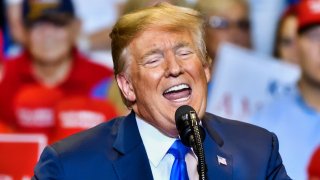Donald Trump Is a National Security Threat
Donald Trump’s policies may or may not be wrong for American national security. Yet, as we saw at the debate, his personality most certainly is. And that is a problem far beyond mere “mean tweets.”
One thing was clear during Tuesday’s debate between former President Donald Trump and Vice President Kamala Harris: Trump rose to every lure Harris threw in the water. Harris repeatedly triggered him, and he lost his ability to make coherent points or avoid bizarre conspiracy theories that he knew would turn off the moderate voters he wanted to appeal to.
The lesson for foreign adversaries is crystal clear: they can play Trump like a harp. The lesson for American voters is clear, too; Trump is simply too impulsive to be trusted with the power of the presidency including, most notably, nuclear weapons.
Trump’s personality is a national security vulnerability.
Harris, for her part, had a clear strategy and executed it well. Yet, it was not subtle. She mentioned his diminished crowd sizes, and he immediately went on a rant that devolved into his repeating a debunked online rumor about Haitian immigrants stealing and eating pets.
She called him out for lying, and he repeated an off-the-wall and obviously incorrect talking point about being so pro-abortion that states now allow executions of babies that have already been born.
She mentioned Vladimir Putin, and, like clockwork, Trump couldn’t stand to criticize the Russian dictator.
She played him. She played him repeatedly, obviously, and aggressively. Everyone watching knew she would try to bait him. Trump must have known, too. And yet he could not help himself.
We saw glimpses of this in his first term, of course. He publicly sided with Putin over his own intelligence agencies in Helsinki simply because Putin “says great things about [Trump].” We saw the “love letter” from North Korea’s Kim Jung Un, which got the North Korean dictator the one-on-one summit with the president of the United States that Kim desperately wanted; in return, the U.S. got nothing. We saw it in the trade deal Trump struck with China’s Xi Jinping, which proved completely hollow.
Yet the debate performance was an even greater warning sign. Putin’s, Kim’s, and Xi’s successes were the product of years of careful planning. They involved countless conversations both between primaries and staff. There was ambiguity as to whether our adversary was just playing Trump or whether there was a genuine deal to be had.
Harris’ playing Trump happened in plain view. Her strategy to get under Trump’s skin was obvious and had even been previously reported upon. Trump could see it happening. And yet he succumbed to his impulse to get angry, even when the stakes were so high.
That American adversary, frenemy, and ally has now seen Trump’s weakness play out in real-time is concerning enough; should he return to the White House, foreign leaders will understand how to get exactly what they want from him in negotiations and conflicts and American national interests will suffer as a result.
Yet even scarier for our national security is his impulsiveness, even when he knows the stakes are high. The president, after all, has nearly unmitigated authority to launch a nuclear strike. The man we saw in the debate was clearly not in control of his emotions, and the rational part of his brain was not driving the car. The debate, with the bright lines shining and tens of millions of people tuning in, is as close as American campaigns get to simulating the pressure of the “3:00 AM phone call.”
Trump answered that call with the reptilian part of his brain. He lashed out and lost all strategic thinking.
Now, imagine if he had access to nuclear weapons.
Trump’s policies may or may not be wrong for American national security. Yet, as we saw at the debate, his personality most certainly is. And that is a problem far beyond mere “mean tweets.”
About the Author:
Neal Urwitz is a public relations and national security executive in Washington, DC.


